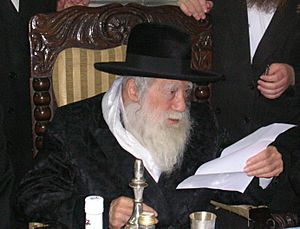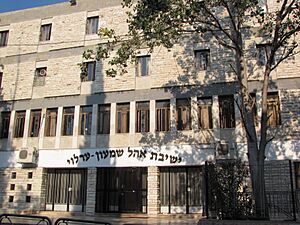Yochanan Sofer facts for kids
Quick facts for kids Yochanan Sofer |
|
|---|---|
 |
|
| Religion | Judaism |
| Denomination | Orthodox Judaism |
| Personal | |
| Nationality | Israeli, Hungarian |
| Born | January 1, 1923 Eger, Hungary |
| Died | February 22, 2016 (aged 93) Israel |
| Spouse | Miriam Pall |
| Children | Moshe Yaakov Avraham Shmuel Binyomin Shimon Akiva Menachem Zalman Yeshaya Dovid Aharon |
| Parents | Rabbi Moshe Sofer Tushena Schoenfeld |
| Senior posting | |
| Title | Erlau Rebbe |
| Predecessor | Rabbi Moshe Sofer (II) |
| Yeshiva | Ohel Shimon-Erlau |
| Began | 1945 |
| Ended | 2016 |
| Other | Presiding member of Moetzes Gedolei HaTorah |
| Buried | Mount of Olives |
| Residence | Katamon, Israel |
| Dynasty | Erlau / Chassam Sofer |
Yochanan Sofer (born January 1, 1923 – died February 22, 2016) was a very important Jewish leader, known as the rebbe of the Erlau community. He was born in Eger, Hungary. His father and grandfather were also leaders there. After surviving the terrible events of the Holocaust, he started a special Jewish school called a yeshiva. He first opened it in Hungary, and then later in Jerusalem, Israel.
Contents
A Family of Rabbis
Yochanan Sofer came from a long line of respected rabbis. His father, Moshe Sofer, his grandfather, Shimon Sofer, and his great-great-grandfather, Moses Sofer (also known as the Chasam Sofer), were all famous Jewish teachers and leaders.
His grandfather, Shimon Sofer, led the Jewish community in Eger for about 64 years. Sadly, in 1944, he and many others from Eger were sent to Auschwitz by the Nazis. At 94 years old, he was killed there, along with his son, Moshe Sofer, and many other people from their city.
Early Life and Survival
Yochanan Sofer was born in Eger in 1923. He learned to be a rabbi from his father and by studying at different yeshivas.
Even though his father and grandfather were killed in Auschwitz, Yochanan survived the war. He found safety in a place called the "Glass House" in Budapest. After the war, he went back to Eger to help lead the few Jewish people who had survived.
In 1946, he and another rabbi, Moshe Stern, became leaders of a yeshiva in Hungary. This was the only yeshiva in the country at that time. Yochanan Sofer even slept in the student dormitory and refused to take a salary. After a year and a half, he opened his own yeshiva in Eger. When the Budapest yeshiva closed, its students moved to his school in Eger.
In 1947, he officially restarted the yeshiva in Eger with a small group of boys, many of whom were orphans. He got married and became the main rabbi for the Orthodox Jewish community there.
Moving to Israel
Because the government in Communist Hungary made it hard for Jewish people to practice their religion, Yochanan Sofer and his community left Hungary. For a short time, his yeshiva joined with another one in Jerusalem.
During this time, he became a close student of Aharon Rokeach, a famous leader from the Belzer community. Even though Yochanan Sofer's family wasn't traditionally Hasidic, he was inspired by Rokeach and others to adopt some Hasidic customs. He even named his youngest son Aharon after Rokeach.
In 1953, Sofer started the Erlau yeshiva and community in the Katamon area of Jerusalem. He bought a few rooms in an old building and slowly expanded it. The yeshiva was named Ohel Shimon-Erlau after his grandfather. He also created a place for students to live and an orphanage for Holocaust survivors and students from families who needed help. He stayed in this neighborhood, unlike some other leaders who moved to different areas.
In 1961, Sofer built a new building next to the yeshiva. This new campus included a main synagogue and study hall for older students, a smaller study hall for younger students, dorms, classrooms, a library, and offices. He also opened a special center to study and share the teachings of his famous ancestor, the Chasam Sofer.
Yochanan Sofer passed away on February 22, 2016. Thousands of people attended his funeral in Jerusalem, and streets were closed for the procession.
Erlau Communities
Yochanan Sofer created a network of Erlau communities in Israel and other countries. These communities include study halls (called Yad Sofer), schools for young children (known as Ksav Sofer), and advanced study centers for married men (called Chasam Sofer). The main communities are in Jerusalem, El'ad, Bnei Brak, Beitar Illit, Ashdod, and Haifa. In Israel, there are about 500 families who are part of the Erlau community.
People knew Yochanan Sofer as the Erlauer Rebbe (in Yiddish) or Admor of Erlau (in Hebrew). He was very involved in his yeshiva, giving daily lessons to students and older community members. He also prayed with his students every day.
Views and Influence
Yochanan Sofer was seen as a leading expert in Jewish law (called halakha). He had a lot of influence on the Orthodox Jewish community. He was also known for his opinions on Israeli politics and security. People often asked him for his thoughts on important Jewish issues around the world.
He was chosen to be a member of the Moetzes Gedolei HaTorah, a council of top rabbis. He was also a member of the administration for a large Torah study project called Mifal HaShas.
The rabbis of the Sofer family and their students had strong beliefs about Zionism, which is the movement to create and support a Jewish state. They believed that the Messiah must arrive before the Holy Land could be truly liberated. They also thought that the Hebrew language should only be used for studying Torah and prayer.
Yochanan Sofer had a similar view to Aharon Rokeach. This allowed for discussions with Israeli leaders and for representation in the Knesset (Israel's parliament). However, it did not mean they fully supported the laws of the State of Israel.
Sofer believed that giving up any land to Arabs would put the lives of all Jews in Israel in danger. He said that even talking about giving up land would show weakness and encourage attacks. He famously told an Israeli minister, "I am not prepared to give up even one grain of the Land of Israel to the Arabs." He also spoke out against Israel's decision to withdraw from Gaza in 2005.
His wife, Miriam Pall, passed away in 1999. They had seven sons.
Images for kids



